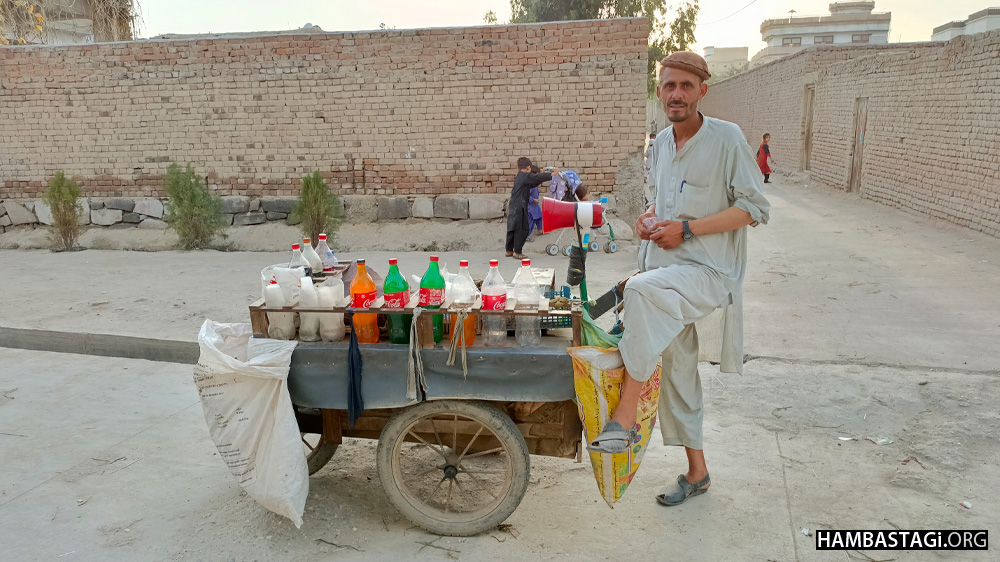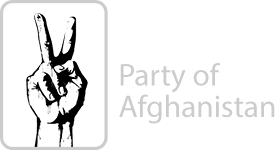The misery of the people of Nangarhar under the horrific rule of Taliban
- Category: Reports
- Written by Zikria
- Published: Tuesday, 02 July 2024
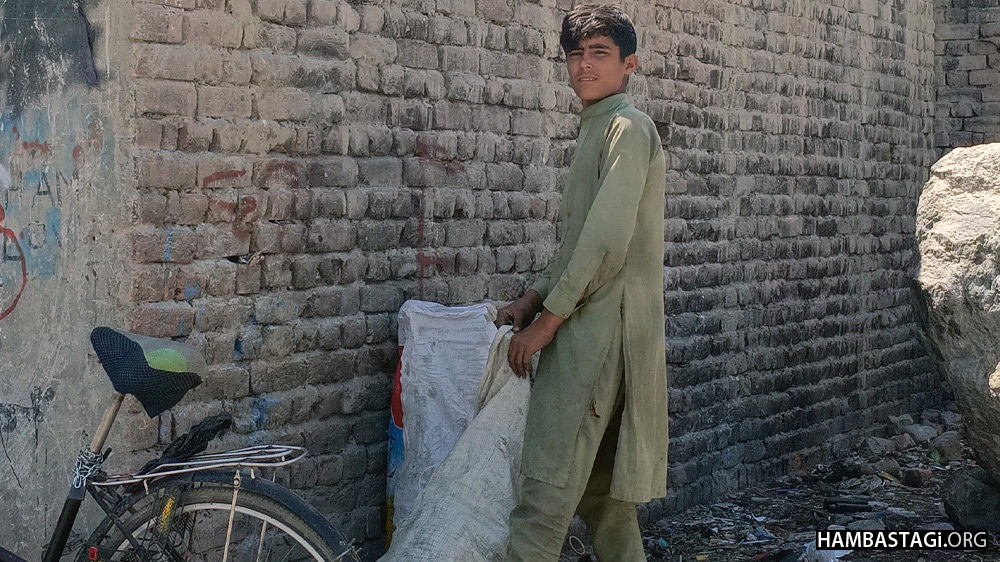
Nangarhar is one of the five major and important provinces of Afghanistan, consisting of 22 districts. This province is considered the industrial hub of the eastern region of the country and a focal point of instability and suffering for the people of Afghanistan. Its capital, Jalalabad, not only serves as a major city within Nangarhar but also for four other neighboring provinces, from which people generally obtain their essential raw materials.
Nangarhar has a population of approximately one and a half million people. Jalalabad is located along the transit route between Kabul and Peshawar, with a distance of 92 kilometers from the Durand Line. The Kabul-Torkham route is considered the main corridor for the export and import of goods between Afghanistan and Pakistan, playing a significant role in the economy of the country, especially for the eastern provinces.
The province hosts numerous large and small factories, including several large marble factories in Surkhroad district, which produce for markets across various provinces of the country and Pakistan. There are factories producing steam boilers like Rashkoh Baba, factories producing rickshaws, and others involved in the production of nails, spices, electrical cables, precious and semi-precious stone cutting, salt extraction, olive oil, and more, all offering high-quality products.
During the twenty years of occupation of our homeland by the United States and NATO, American soldiers built bases in the "Khalizi" area of Haska Meyna district and Momand Dara district of Achin, conducting devastating bombings under the name of "fighting terrorism," resulting in the deaths of thousands of innocent people. Occupiers frequently targeted weddings and public gatherings, causing widespread death and destruction. For example, on July 7, 2008, American forces bombed a wedding ceremony in Deh Bala village, killing the bride, 51 women, and children. They even tested the "mother of all bombs" in Nangarhar, causing ongoing environmental damage, including a high rate of birth defects among infants.
Before the Taliban regained power following the installation by the United States and the West, every spring season in Nangarhar, the Orange Blossom Festival was held with various cultural and emotional programs, a tradition dating back half a century. The province also has distinctive music played with special instruments such as the tabla, rubab, and shtar, but like other provinces, the cultural perspective deliberately kept the people of Nangarhar backward. Decades of insecurity and the rule of jihadist and Taliban factions have led to most children and adolescents in this province being deprived of education, fostering conditions conducive to extremism, misogyny, intellectual stagnation, and other social ills. Various reactionary and mercenary groups such as Jihadists, Taliban, ISIS, Salafists, and Wahhabis have rapidly recruited among children and youth to achieve their goals—turning our country into a center for global religious fascism and a launching pad for terrorism against America's rival countries.
With abundant natural resources and a suitable climate, it is needless to say that like all other provinces of our homeland, no regime or institution has made any efforts for the progress and development of Nangarhar. Its hardworking people are completely deprived of even the most basic facilities such as electricity, roads, hospitals, schools, and in short, the most rudimentary amenities. Over the past four decades, the people have only tasted the bitterness of poverty, insecurity, and suffering.
Security situation after Taliban rule:
With the Taliban's return to power, a large number of mysterious killings occurred in the early days, and every day unidentified bodies were found from the outskirts of the city. Even two months after the Taliban regained control, the canal water in this province was blocked for reasons unknown. People living on the outskirts of this province claimed that many headless bodies with tied hands were pulled out of this river. Some Wahhabi and Salafi clerics were also killed, and their bodies were thrown into the corners of the city.
One of the residents of the second district of Jalalabad, named Abdullah, who was the main resident of Alingar district, was a woodcutter and also served as an imam in one of the mosques. In the spring of 2021, they moved him to Chapa district on the pretext of woodcutting, and he separated his head from his body with his own axe. His head was later recovered from Angor Bagh and his body was later found in the Ring Road area.
One of the shopkeepers (name withheld) of the dry basin who had survived from the clutches of these savages, tells his story in this way: "One day when the body of Rahimullah Haqani was from the leaders was suicide, one of the shopkeepers asked him not to go to Haqani's funeral. I had made a few insults to Haqani and said I would go to Haqani's dog, but I would never go to Haqani's fellow countrymen. Some spy said this to Taliban and the next day I was sitting in my shop when a few masked Taliban came and took me to the security command first and then turned their motor into to the side of graveyards with my eyes closed. They took me to the vicinity of Chapa district, where the slaughterhouse of these savages was located, and tortured me to the point of death and cut me up with their guns. They wanted to kill me. One said we cut off his head with a knife and another said it is too late, we shot a few rounds at his face and let him go. I cried and begged them not to kill me because I was the only breadwinner in my house. I don't know what happened, they didn't have a chance to kill me and released me with closed eyes. When I opened my eyes, I saw that there were many bodies hanging and hanging in the trees. All my body was trembling, with fear and terror I immediately fled from there."
On August 17, 2021, the youth of Jalalabad city carried the tricolor flag of the country on the streets, which were confronted with severe clashes by Taliban forces. The youth also resisted and wanted to hang the flag high inside the city, which was shot down by the Taliban, and three of our compatriots were martyred.
On February 8, 2024, the people of Barikab area of Nangarhar province launched a protest rally against the occupation of their homes. These lots are distributed by the former government and the people have rebuilt the houses with great difficulty, but the Taliban wanted to occupy these houses by force. The Taliban fired on the protesters and moved three people around and killed them in broad daylight. The people resisted and the issue remained unresolved.
Similarly, countless former soldiers, local journalists, intellectuals, civil society activists, and even doctors and engineers and businessmen are hunted down and killed by the ignorant group on daily basis. Most survivors and relatives of the victims are not afraid to admit that they were killed and have no authorities to complain to and ask for redress.
In addition to murder and slaughter, theft and robbery incidents, such as the past, have been reported, and despite dozens of attempts, thieves and robbers are not identified and arrested. People say that these areas have also learned from the past government and are complicit in theft.
Mental pressure and problems of the people:
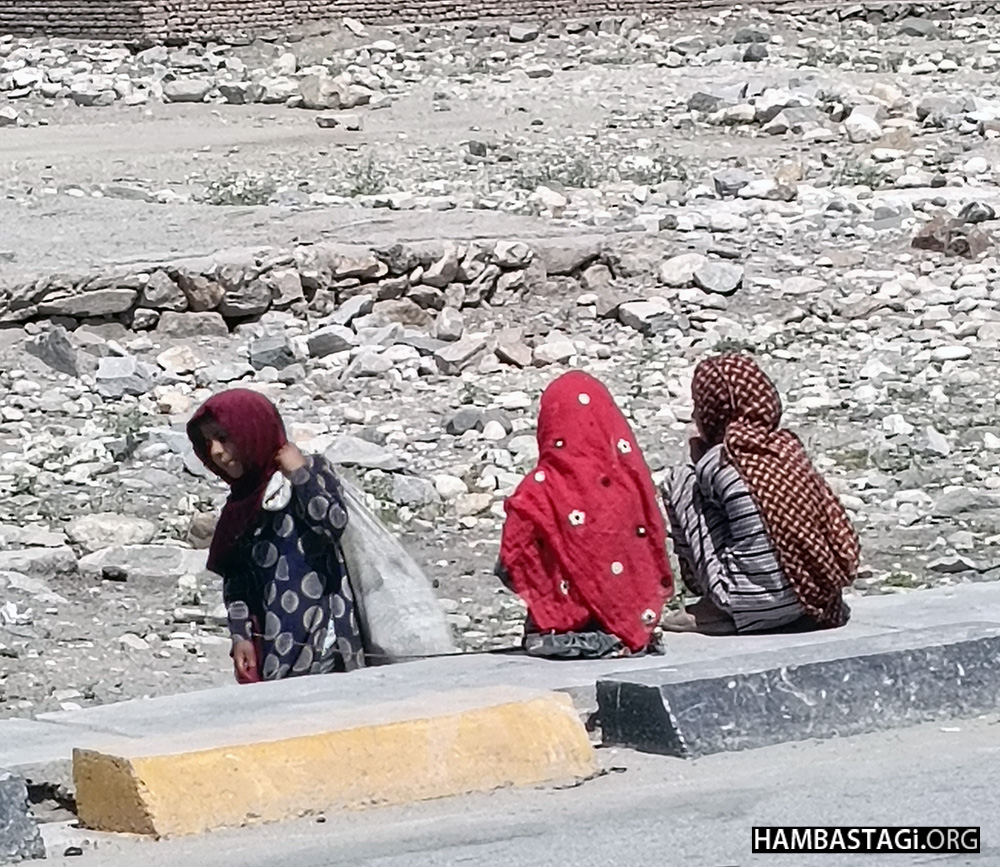
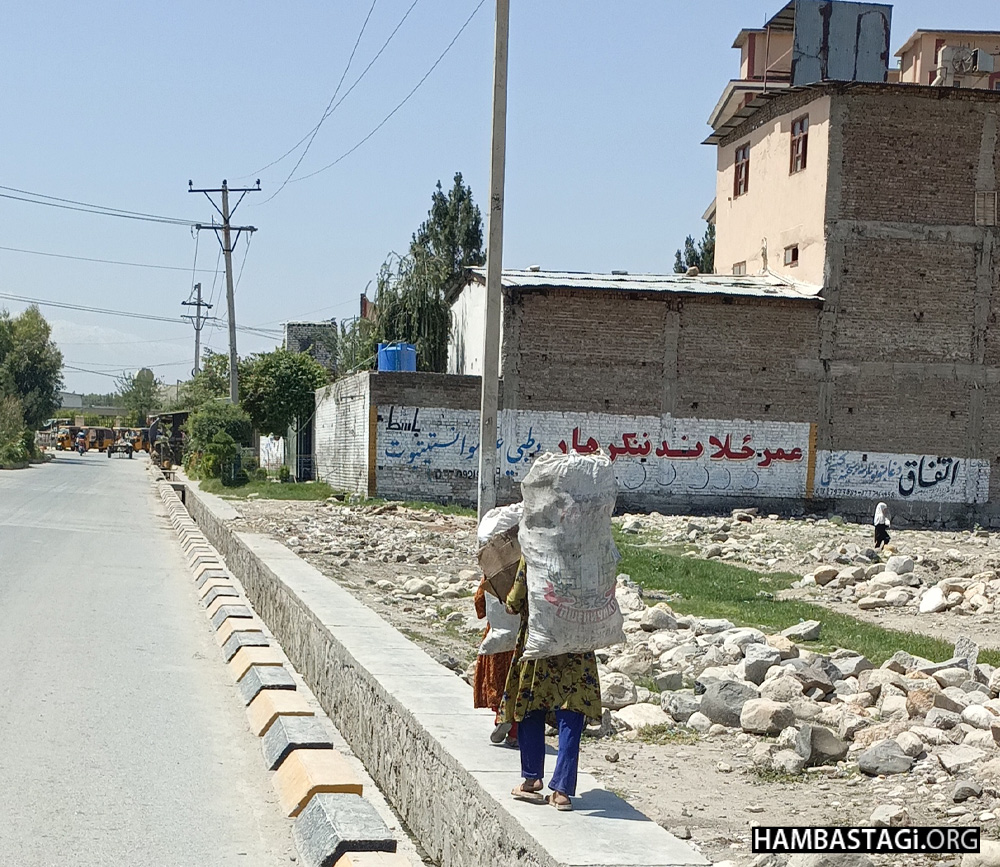
Street children in Jalalabad
After the return of the Taliban, the ignorance and death of the people of Nangarhar province, like other parts of the country, have faced severe economic, social, and political conditions and have been subjected to various psychological pressures, to which we will briefly mention:
Lack of intellectual, civil, social, cultural, freedom of expression, media, and other forms of freedoms and rights, especially for women, have placed the people of this province under unbearable mental and psychological pressure, increasing suicide rates among young people, especially among girls who are prevented from continuing their education.
The imposition of long beards for all men, wearing hats for government employees, threatening and ordering all barber shops not to shave the beards and not to accept the fashion of any kind of boys' hairstyles, and in short, the lack of such personal and basic freedoms have played a prominent role in increasing mental and psychological pressure.
Failure to find work and employment for workers, especially daily wage workers, and the extortion of emirate agents from the caravans and vendors and rickshaw owners of the city, etc. in circumstances where they have no income, has driven their lives into destruction. The economic hardship itself has caused a significant increase in depression and despair among young people and forced everyone to leave their country. Most of the workers of this province have gone to Pakistan and Iran and have died in exhausting conditions for the relief of their families.
The closure of schools, universities, and educational centers for girls, the home confinement of female government employees, the complete closure of women's hairdressers, tailors, recreation clubs, sports clubs, etc., has caused severe mental disorders and severe depression in the women of this province. On the other hand, since the rate of domestic violence and physical violence against women in Nangarhar is very high, but the victims have no sponsor and supporter, this has increased the suicide rate among women.
The prohibition of music in wedding ceremonies and family gatherings and the use of Taliban songs instead of regular music and other actions like those of the Stone Age have destroyed the smallest avenues of life and joy and made Nangarhar society grief-stricken and desolate.
Another calamity imposed by the Taliban on the people of this province is mandatory prayers in mosques. During prayer times, their moral police officers ride motorcycles equipped with loudspeakers, threatening everyone to close their shops and join the lines in mosques. Interestingly, they force laborers, shopkeepers, and passersby to comply, yet during this period, they themselves wander the streets with their rangers.
Impact of Poverty and Austerity in Nangarhar:
In the province of Nangarhar, the unemployment rate has soared, causing not only hardship and destitution among the people but also directly impacting the security situation. Poverty and unemployment have exacerbated several critical issues:
Due to intensified poverty in Jalalabad city, young boys and girls, children, and the elderly are visibly resorting to begging due to the lack of stable financial resources. An elderly woman named Zakiya, who begs in the city center, tearfully expressed her anguish:
"I had three children, two of whom were martyred in military camps, and another who was a police officer martyred in Hesarak district. Neither the Ministry of Martyrs provides any assistance nor are my martyred family members eligible for any pension. With this white-hair (showing she is too old), I have no choice but to beg for alms to support three families. Who listens to our pain? Who helps us? What will become of my grandchildren's future?"
Like Zakiya, hundreds of elderly men and women daily stand at people's doors, seeking flour, bread, cash, and old clothes. This phenomenon has seen a significant increase in the past two years.
Many adolescents and children, both boys and girls, collect garbage, iron scraps, plastic, and other items to provide for their large families. Most of these children, having lost their fathers due to various reasons like poverty and war, become the main breadwinners of their families. Carrying such a heavy burden at a young age deprives them of proper education and upbringing, exposing them to various forms of violence, trafficking, addiction, obscenity, and corruption, or causing them to drop out of school.
Rising crippling taxes are another factor contributing to poverty in this city. Many shopkeepers and businessmen complain about revenue shortages on one hand and are unable to afford increased taxes on the other. Heavy taxes have forced some individuals from poorer sections to abandon their shops or occupations. (This tax law has changes recently and there are reduce in the tax for smaller shops. This happened only two weeks ago.)
Corruption and bribery in government offices, especially in security institutions, are another phenomenon inherited from the previous regime that has exacerbated the suffering of the vulnerable population. To the extent that even thieves and thugs, once apprehended, are released after paying bribes to security agencies.
If domestic or international institutions plan to distribute aid, they are compelled under pressure from the Emirate's authorities to allocate a significant portion to individuals favored by the Taliban, practically leaving the needy without assistance.
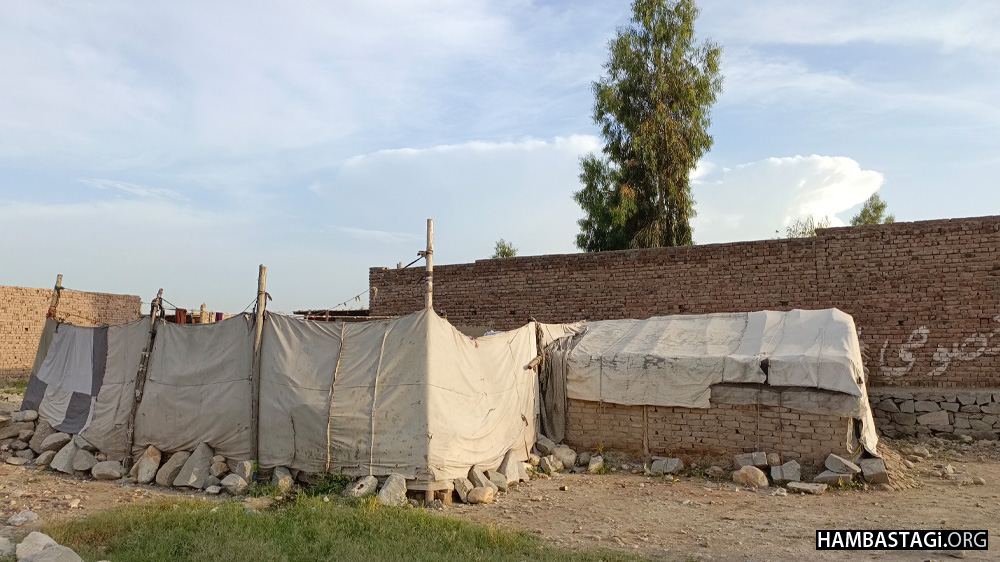
Despite hot weather, people are living under plastic tents due to dire poverty.
This issue has even cast a shadow over the health sector. Taliban militants have repeatedly entered hospitals and violently demanded doctors at the central hospitals of Nangarhar or general practitioners to prioritize their relatives and make their allocated share of medicine available, leaving almost nothing for the treatment of the most vulnerable people who, with their last hopes, turn to these government hospitals from remote provinces.
Drug addiction in Nangarhar province has reached unprecedented levels, primarily stemming from unemployment, hopelessness, and despair in life. In every alley and corner of Jalalabad, youths are seen succumbing to addiction, tearing apart their families' lives.
Although initially, the Taliban rounded up a large number of addicts from the city, currently, addicts of all ages are increasingly present in every nook and cranny and ruin of Jalalabad city, growing in number every day. Sometimes, the Taliban brutally and mercilessly beat these sick addicts to demonstrate to passers-by that the Islamic Emirate has a plan and implements measures for the "eradication" of addiction and heroin.
Zabihullah (pseudonym), a resident of Jalalabad city, recounts his eyewitness account of the Taliban's treatment of addicts:
"On one of the days of last Ramadan (2024), the Taliban arrested four addicts, tortured them first, and then threw them with their hands tied from behind into the cold air between the river in Jalalabad city, where only one person survived from among them, and the other three drowned."
Another source has confirmed the Taliban's killing of addicts and adds that this crime is committed daily and covertly.
In other districts of Nangarhar:
Nangarhar is one of those provinces that, under the corrupt regimes of Karzai-Ghani, paid scant attention to its growth and prosperity, leaving its people estranged with the most basic rights and living conditions. However, during the twenty years of the US occupation and nearly three years of Taliban rule, various districts within it saw the establishment of numerous schools aimed at promoting the twisted ideologies of Talibanism. For example, in the Khewa district alone, several schools have recently opened for this purpose.
Over the past twenty years, the people of the border district Moman Dara, who have largely been left behind in terms of progress and education, were under the influence of Farydoon Momand (a parliamentarian of the Karzai-Ghani government), acting as an ISI spy involved in arms and mineral smuggling in this district.
The Kamah district, compared to other districts of Nangarhar, is known for its fertile lands, yet its farmers are impoverished and landless, lacking adequate support and attention from governments.
In Bihsood, considered one of the most prosperous districts of Nangarhar, dozens of schools have been established to promote the extremist ideologies of Wahhabism and Salafism among children and youth as ruthless fighters for Taliban and ISIS. Currently, ISIS operates in regions such as Daman, Sarayat (where most residents are from Kunar and Nuristan provinces), and several other areas of this district, secretly recruiting and promoting among young boys and girls.
The Kut district, located 25 kilometers east of Jalalabad, has suffered immense damage in recent years due to the presence of ISIS. Despite Taliban control, schools promoting Wahhabi and Salafi ideologies are secretly active.
The picturesque Betikot district was once a major center of ISIS activities in 2016 and 2017, suffering greatly in the three-way clashes between the government, Taliban, and ISIS.
In Achin, one of the remote and active districts of ISIS, according to reports, during the final nights of last Ramadan, ISIS secretly distributed $300 USD in cash to its targeted individuals.
Most residents of the Dar-e-noor disrict have been displaced due to poverty and destitution, with countless youth losing their lives. There are few families in Dar-e-noor who have not suffered the loss of loved ones in the deceptive wars between the government and the Taliban. Currently, both former soldiers and these unemployed youths face insecurity and fear of arrest by the Taliban, leading them into destitution and uncertain futures.
Recently, ISIS has clandestinely recruited many youths from this district and intensified its activities. For example, on January 18, 1402, in the Waigal area of this district, ISIS members ousted and killed one Taliban member from his home at night, taking his weapons.
The residents of Surkhroad district, mostly engaged in agriculture, are suffering from drought. Behirullah, a farmer in this district, recalls that for five or six months of the year there is enough water for cultivation, but the remaining months are parched due to the drying up of the Surkhroad River. They have no expectation or hope for any assistance from the criminal government, having experienced decades of hardship.
The Hasarak district, due to its strategic location and border with Azra and Logar districts of Logar province, has been a focus for extremist groups and drug traffickers. Recent reports indicate a growing infiltration of ISIS in this district. On January 17, 1402, ISIS members threw a hand grenade into the home of Taliban cleric Gholam Jilani, killing his four children.
The people of Nangarhar province have spent decades in darkness and bitterness, enduring day and night under oppression and hardships. However, with a deep sense of patriotism, most of them thirst for knowledge and progress, knowing well that the traitors and mercenaries of republicanism, Talibanism, and ISIS have exploited them for their wicked ends. They believe that the only way to defeat all bloodthirsty enemies is through unity and collaboration. They know that by following noble, humble, and hardworking individuals like Kaka Murad (Dr. Nakamura), they will be able to secure a better and brighter future for their children!
